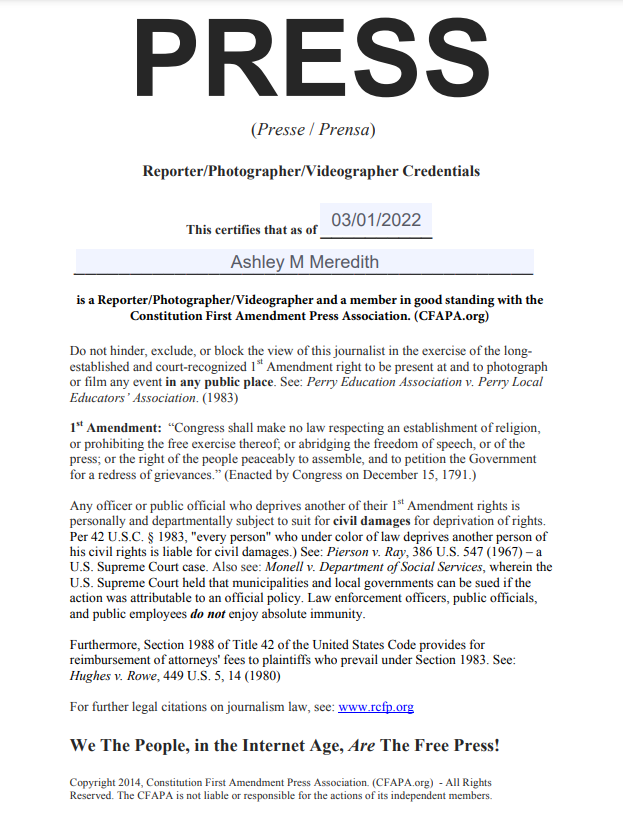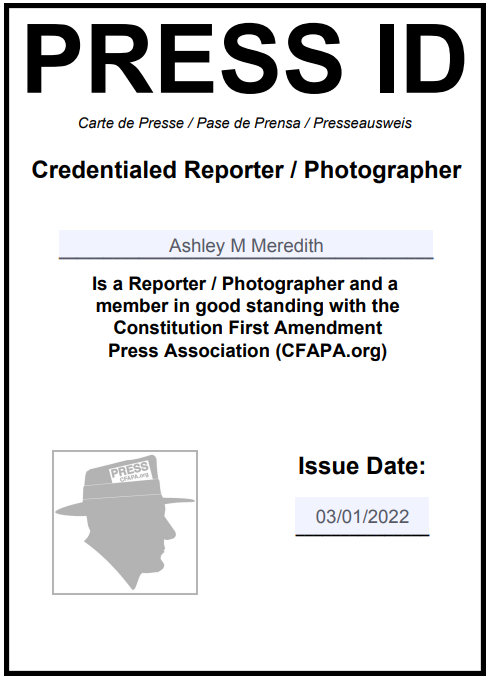As found on the Constitution First Amendment Press Association website

The CFAPA Constitutional Journalist’s pledge melds the traditional Journalist’s Creed of 1914 with some phrasing from the more recent Associated Press News Values Statement, along with some key amplifications of our own.
As a condition of membership in the Constitution First Amendment Press Association (CFAPA.org), I do hereby pledge:
- That I will comport myself in a manner worthy of a position of public trust.
- That I will report news honestly, thoroughly, accurately, fairly, and forthrightly.
- That I will let the facts and photographic/audio recording evidence speak for themselves.
- That I will speak, write, produce, and publish the truth, the whole truth, and nothing but the truth.
- That I will uphold and defend the Constitution and all of the Bill of Rights.
- That I will not abuse my position as a journalist or accept bribes.
- That I will be stoutly independent, and will not bow to threats or coercion, even under Color of Law. If confronted by authorities who are not knowledgeable or disdainful of my Constitutional Rights, then I will politely inform or remind them of my rights and then press on with my news-gathering and reporting.
- That I will be unmoved by pride or greed of power.
- That I will be constructive but never careless, self-controlled, patient, always respectful of my readers but always unafraid.
- That I will be quickly indignant at injustice and unswayed by the appeal of the privilege or the clamor of the mob.
- That I will strive to avoid inaccuracies, carelessness, bias or distortions.
- That I will not knowingly introduce false information into material intended for publication or broadcast; nor will I alter a photo or video content. Quotations must be accurate, and precise.
- That I will always strive to identify all the sources of my information, shielding them with anonymity if they request it and when they provide vital information – not opinion or speculation; when I know the source is knowledgeable and reliable.
- That I will not plagiarize. I will give credit where credit is due, attributing quotes prominently.
- That I will not pander or bow to party politics, pressure groups, agenda pushers, conspiratorial cabals, statist lackeys, censors, or those who seek to hatefully divide us.
- That I will avoid behavior that compromises my ability to report the news fairly and accurately, uninfluenced by any person or action.
- That I will not misidentify or misrepresent myself to get a story. When I seek an interview, I will identify myself as a journalist.
- That I will not pay newsmakers or celebrities for interviews, to take their photographs, or to film or record them.
- That I will be objective and not speculate or promote any unsubstantiated gossip, rumors, or urban folklore–always being mindful that extraordinary claims require extraordinary proof.
- That I will be fair. When mistakes are made, they must and will be corrected – fully, quickly and ungrudgingly.
Signed,
Ashley M Meredith


